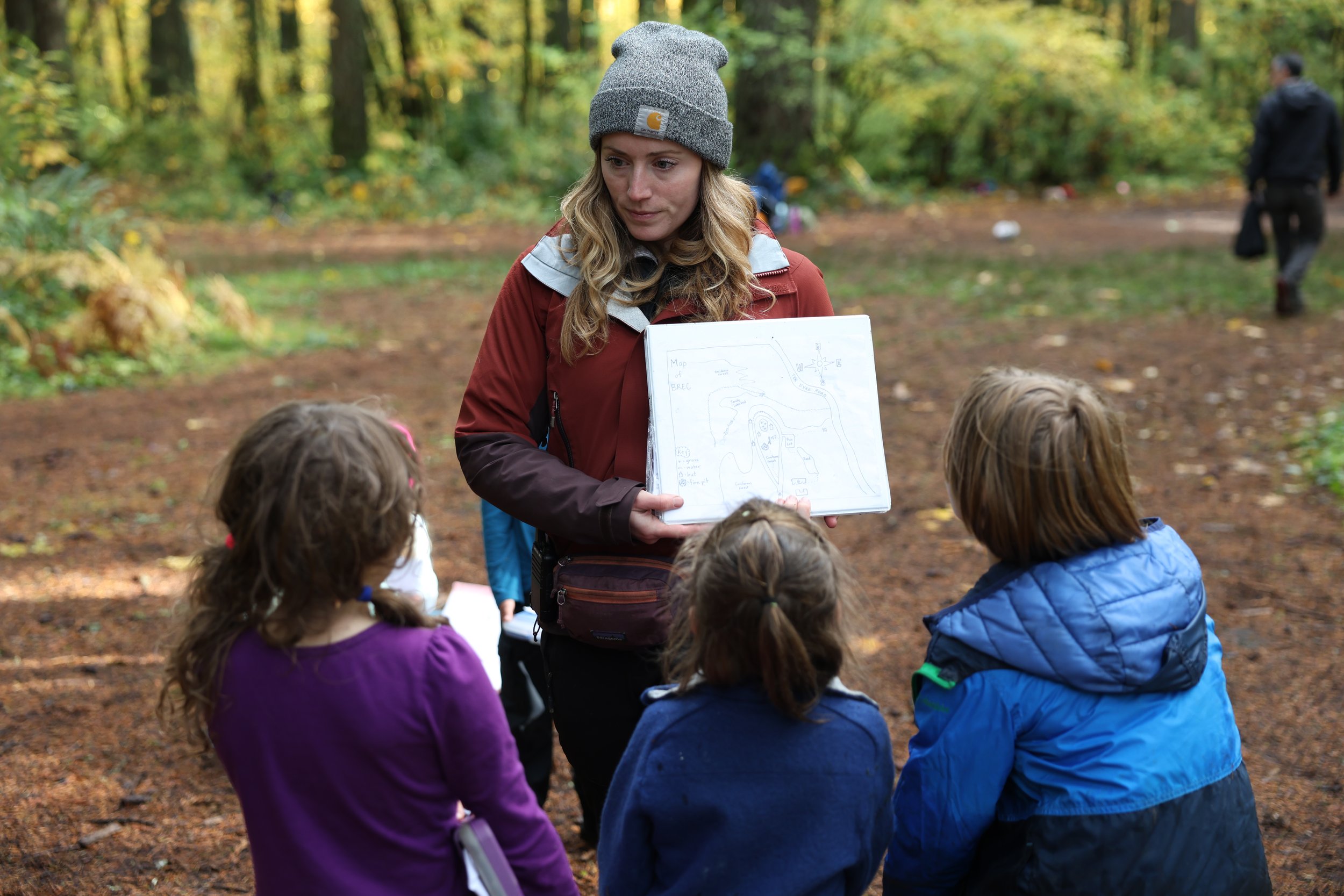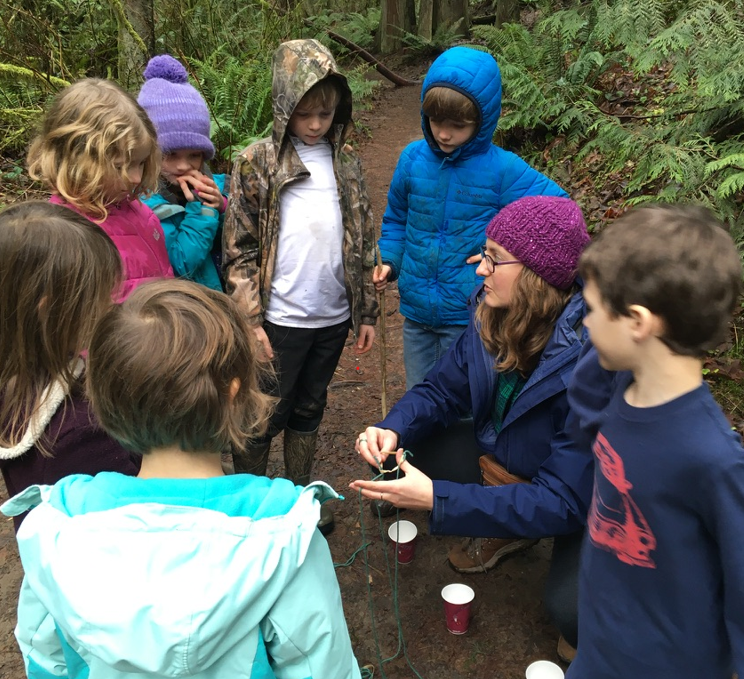
Why Education Outdoors?
The benefits of learning outside:
-
Improved Academic Performance
Learning outside can enhance engagement and motivation and supports academic growth by making learning engaging and relevant. Students gain a deeper understanding of subjects through hands-on experiences, leading to better retention, critical thinking, and higher achievement in core areas like science, math, and language arts.
-
Builds Resilience and Confidence
Outdoor learning presents challenges that require adaptability, perseverance, and problem-solving. Overcoming these challenges helps build resilience and confidence, preparing students for future challenges in life.
-
Supports Mental Health
Time spent in nature reduces stress, anxiety, and symptoms of ADHD. It helps improve focus, concentration, and mood, leading to a calmer, more focused learning environment and over all emotional balance.
Busy environments can cause sensory overload, resulting in tension and mental fatigue. Studies have shown that our minds and bodies relax in a natural setting. This increases feelings of pleasure and can help us concentrate and focus more effectively.
Nature can help decrease your anxiety levels and can help lessen stress and feelings of anger.
Regular access to green spaces has been linked to lower risks of depression and improved concentration and attention.
-
Being out in the Rain
Going out in the rain can boost mood!
When it's raining, droplets of water hit surfaces and break into smaller droplets, this causes the smaller droplets to become negatively charged which creates negative ions.
Also when rain falls on dry soil an earthy smell called "petrichor" is released. Petrichor contains a chemical called geosmin which comes from bacteria in the soil.
Scientific studies have shown that inhaling both negative ions and geosmin, can make people's mood more positive, reduce stress levels, and increase energy levels.
Rain also washes away dust, pollen and dirt in the atmosphere which makes the air fresher and cleaner.
-
Develops a Passion for Learning
Learning outdoors activates multiple senses, making education more dynamic and memorable. Students see, hear, touch, and sometimes even taste and smell their surroundings, leading to more profound and lasting learning experiences.
By sparking curiosity and creativity, outdoor education instills a love for learning. Students become more engaged, motivated, and excited about their education, laying a foundation for lifelong learning and growth.
-
Improves Physical Wellness
Outdoor time can help you be more active and sleep better. The light helps balance your sleep and energy use.
Studies show that being in nature has a positive effect on our bodies by reducing cortisol levels, muscle tension and demands on our cardiovascular system (lowers heart rate and blood pressure). Being out in nature often may lead to lower rates of heart disease. The great outdoors can also help you increase your vitamin D level, which is important for your bones, blood cells, and immune system.
-
Improves sleep
The outdoors helps set your sleep cycle. Cells in your eyes need enough light to get your body’s internal clock working right.
Typically, your body’s internal clock follows the sun, making you feel awake during the daytime and sleepy at night. Although artificial illumination can mimic natural light, direct sunlight has 200 times the intensity of office lights in a closed room. As a result, sunlight affects your circadian rhythm more than electric light.
-
Boosts Creativity
Studies show that time in nature can boost your creative problem-solving abilities. This is partly because the outside world engages your attention in a quieter way that lets your attention refocus. The more time you spend, the bigger the benefit, but even just "getting out for some air" can nudge your brain into a new thought pattern.
-
Lessens Anxiety
Sunlight helps keep your serotonin levels up. This helps raise your energy and keeps your mood calm, positive, and focused.
-
Improves Focus
Studies show that it’s not just the activity done outside, it’s the “greenness” of the outdoor space. In one study, kids with ADHD were able to concentrate better on a task after a walk in the park than they were after a walk through an urban area.
-
Fosters a Connection to Nature
Learning outside instills a love for the environment and a sense of stewardship. Students become more aware of ecological issues and more inclined to engage in sustainable practices that protect the planet.
-
Experiences Cold Weather
Cooler temperatures boosts your brain function, increases brown fat, boosts metabolism, burns calories, improves allergies, lowers inflammation, lowers risk of diseases and infections, helps you sleep better, rejuvenates skin, and betters your heart.
-
Helps Immunity
Spending time outdoors can still help your immune system function optimally.
Vitamin D production from sunlight is already good for your immune system but the outdoors can help in other ways as well. Many plants put substances, including organic compounds called phytoncides, into the air that can boost immune function. Sunlight also can energize cells in your immune system called T cells that help fight infection.
Microorganisms found in nature that aren’t dangerous can run practice drills with your immune system, in a manner of speaking, to help prepare it for more serious infections.
-
Protection from Short-sightedness
There’s evidence to suggest children who spend plenty of time outside have a lower chance of developing myopia, or nearsightedness.
Natural light offers a brighter and richer collection of light wavelengths to see with.
The outdoors lets your eye practice looking at objects from various distances.
Light stimulates the retina to produce dopamine, which can prevent your eyeball from stretching out and warping your vision.




